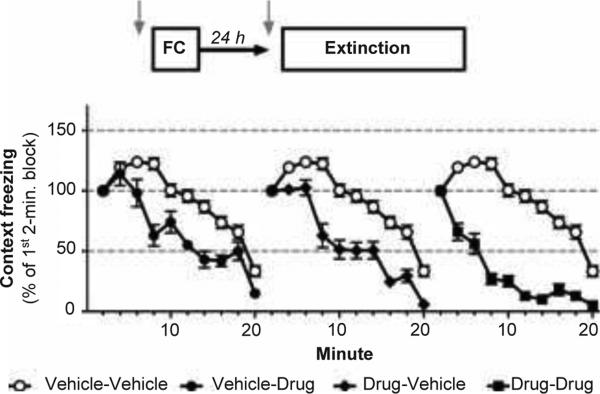Figure 3.
The CRF1 receptor antagonist antalarmin weakens FC and accelerates fear extinction in rats. CRF powerfully modulates memory and stress-responding through activation of CRF1 receptors. However, no data exists on the potential utility of these drugs for treating PTSD. We reanalyzed data from a 1999 study by Deak et al published in Endocrinology (experiment 1) examining the effect of antalarmin on context FC and retrieval [159]. Since this experiment used 20-min LTM tests that produced significant extinction, we hypothesized that antalarmin reduced retrieval primarily by facilitating fear extinction. Original data were generously provided by Terrence Deak for the new analysis. Since antalarmin did slightly weaken initial fear retrieval as assessed by freezing behavior, we normalized responding to freezing in the first 2-min of the test to evaluate extinction. Rats were injected with Drug or Vehicle prior to context FC on Day 1. On Day 2, half of each group received the same treatment and half received the opposite treatment. (Left) Antalarmin accelerated extinction learning in rats that were conditioned drug-free. (Middle) Rats conditioned after antalarmin injections showed faster extinction when tested drug-free on Day 2. (Right) These effects were additive, as rats injected with antalarmin pre-conditioning and pre-extinction extinguished faster than any other group. These data support the notion that CRF1 receptors antagonists may be particularly useful drugs for PTSD since they can blunt fear learning and facilitate fear suppression when combined with CS exposure. However, since the experiment wasn't designed to assess extinction processes it remains unclear whether the facilitation by antalarmin acutely translates to LTM for extinction in the drug-free state.

